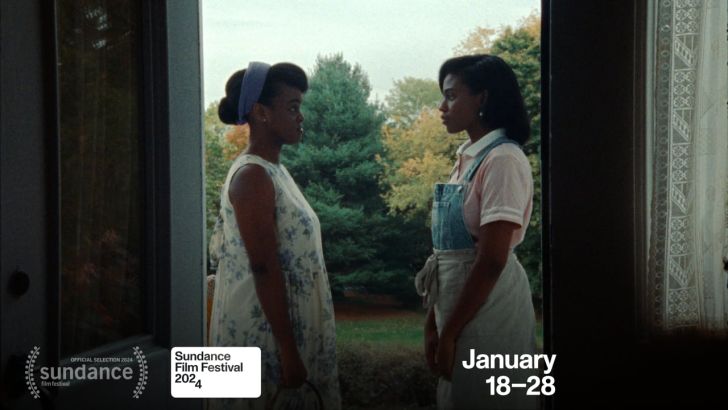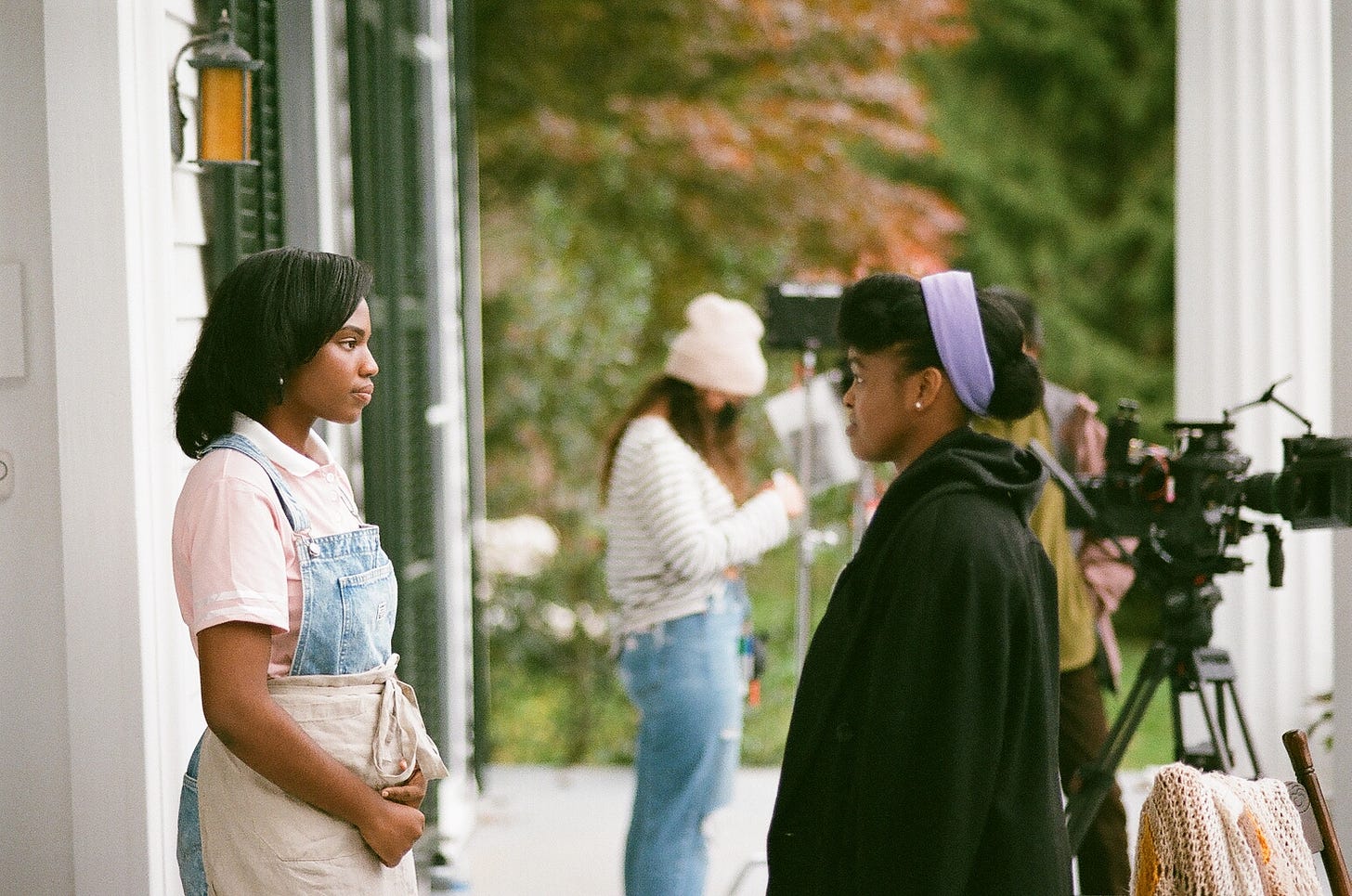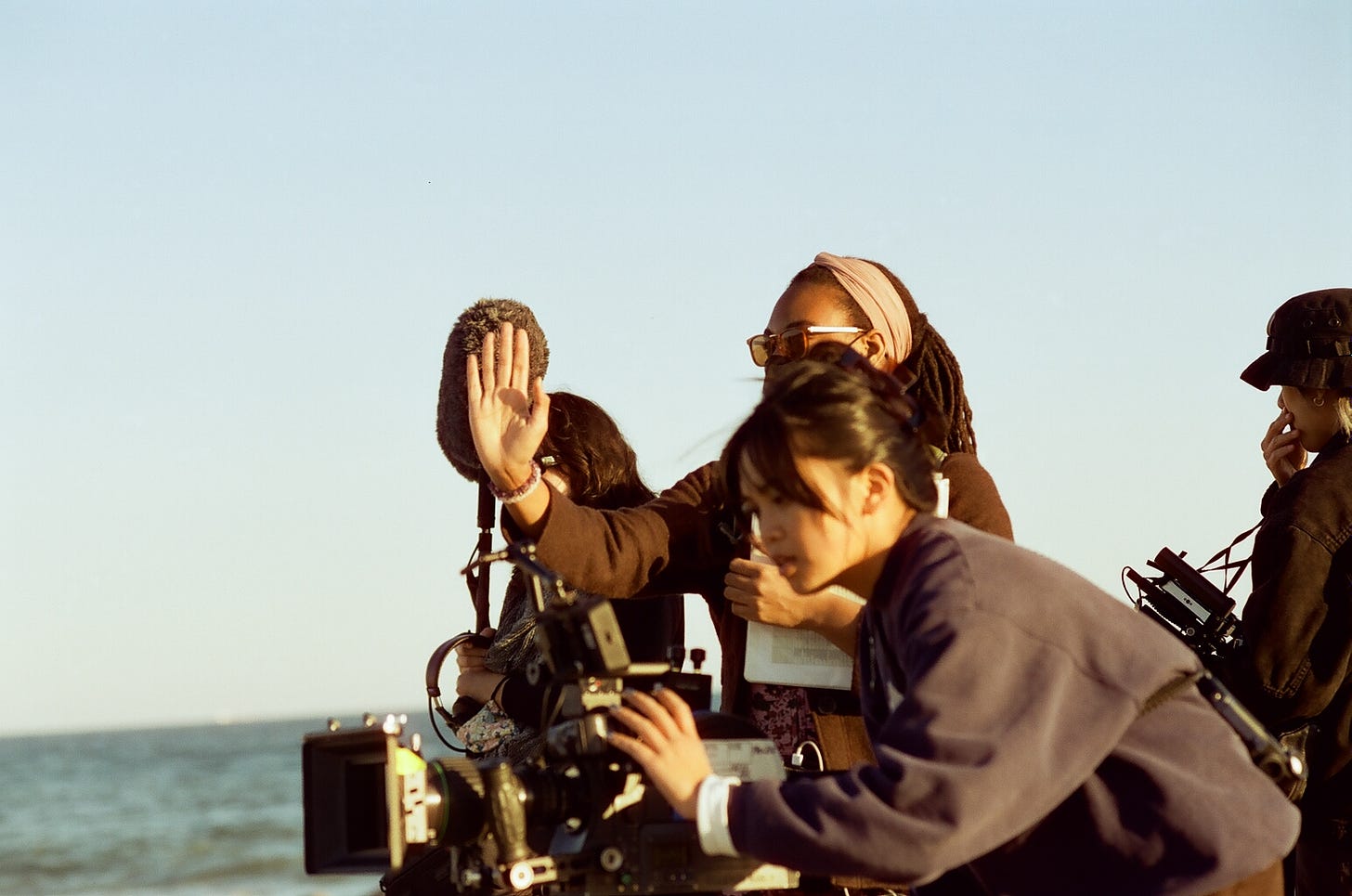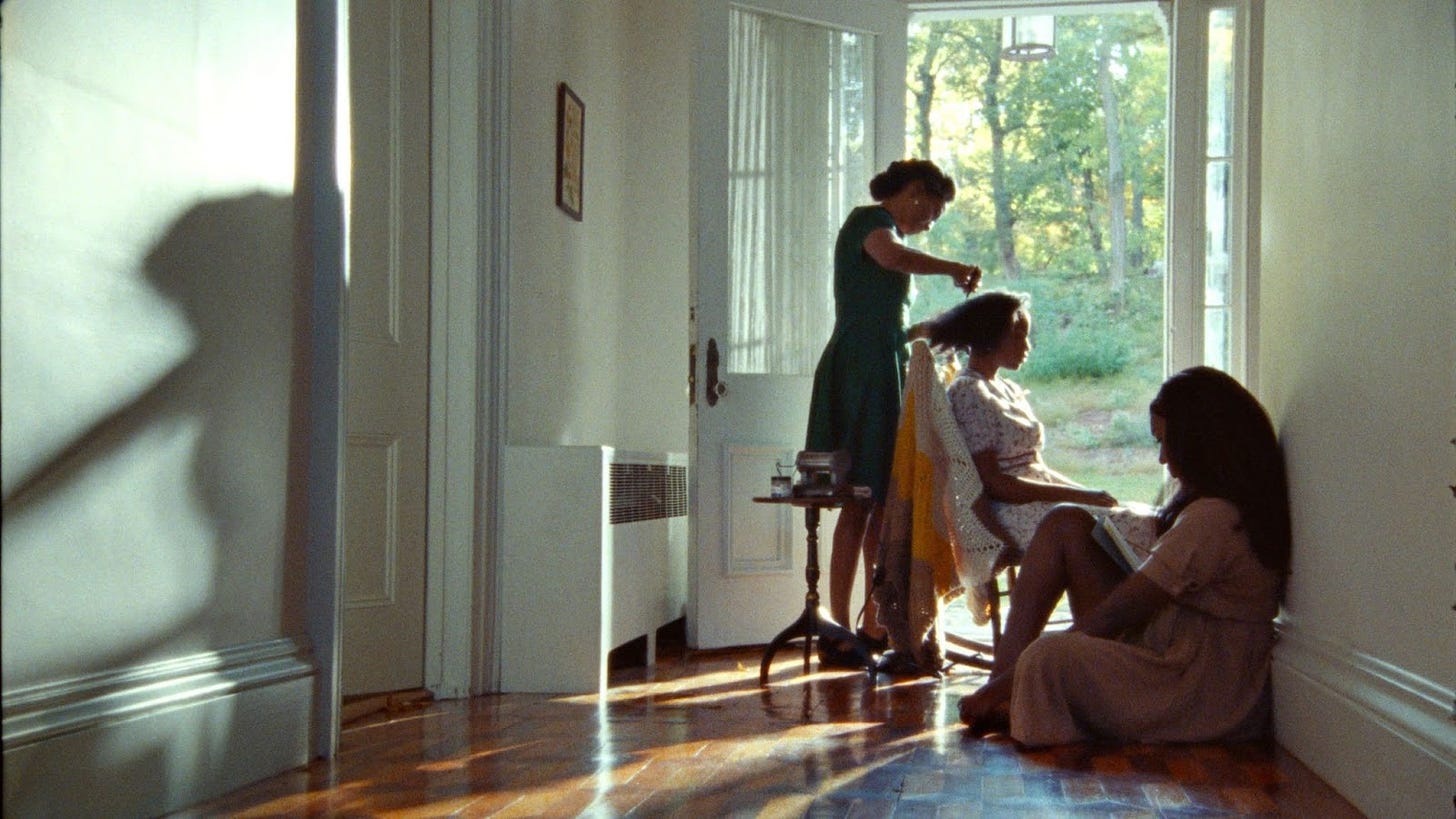Natalie Jasmine Harris's First Time at Sundance Was Validating
Nevin Kelly-Fair talks to Natalie Jasmine Harris about her dreamy new short, 'Grace.'
Hello! Welcome to Nothing Bogus, an Indie Film Listings+ newsletter. The + is commentary, interviews, dispatches, tutorials, and other groovy stuff. This week, filmmaker Nevin Kelly-Fair is filling in. He interviewed Natalie Jasmine Harris, whose new short, Grace, recently played at Sundance. You’ll find the listings at the bottom of this email.
by Nevin Kelly-Fair
Writer, director, producer, and costume designer Natalie Jasmine Harris’s Grace is a dreamy 16mm queer Black Southern gothic tale, that beautifully explores tradition and societal expectation. The film finds sixteen-year-old Grace preparing for her baptism in the rural 1950s South. When she learns she must repent before the ritual, she begins to question the budding romantic feelings she has toward her best friend, Louise. Harris, whose previous two shorts also explored tradition, crafts a contemplative and melancholy world, spotlighting old repressions through a keen and modern eye.
After loving the film out of Sundance, I was thrilled to sit down with Natalie to discuss her experience making the short and what’s next for her.
I’d love to hear about the ideation and writing of the project. What were your inspirations and how did the core concept of the short come to you?
Natalie: The idea came from a couple of different places. For one, my grandma grew up in New York City but her mother, my great grandmother, would often send her and her sister down south to meet their relatives and stay for the summer and have a life that is very different from living in the city. I was always told stories about those summers from her. She always remembered those moments.
I also have a relative who recently came out. And I had no idea that anyone else in my family was gay. This person is in her eighties and I was really struck by that and what it must have been like to carry around this part of you that you weren’t fully able to share. So I placed her, or also a version of me if I was born in that time, into the story and into the world that my grandma would tell me about, while thinking about what it must have been like for queer people in the past.
How did you go about financing the short? Did you get any help from organizations or crowdfunding in the process?
Natalie: We had a lot of really great support. I did two Kickstarter campaigns for the film—one for the shoot and one for post-production. We had around 300 backers. The people at Kickstarter are very kind and were super helpful in amplifying the film.
I got support from the really amazing organization The Future of Film is Female and [its leader] Caryn Coleman. And I also was in the Jacob Burns Creative Culture program. It’s now at BAM, and it’s called UFO. I started the film in the first half of that program and got amazing support. I also got a grant from the Scout Film Festival, which is a youth film festival in Boston that really helped.
And some individuals came forward to help. Mikayla Lashae Bartholomew, one of our actors who was also the star of my short film Pure, has a relationship with Aunjanue Ellis-Taylor who really loved the story and supported it and came on as an EP, and that helped us get our 16mm film processed.
And similarly, we had someone from Blue Slate Films actually donate the film stock to us and came on as an EP. That was a huge resource.
How did you go about casting the film? In particular, how did you go about casting Jordan Wells as the titular character of Grace?
Natalie: I knew I wanted Mikayla [Lashae Bartholomew] to play the sister from the minute I wrote the script. I already knew that and it was a matter of figuring out the rest of the cast. We had a really great casting director, Sujotta Pace, who’s very much a part of the Black NYC actors scene, even though our lead actor Jordan came from LA [laughs]. She helped us out with auditions. She recommended we audition Alexis Cofield, who plays Louise, and is actually one of my really close friends.
I ended up casting Jordan as Grace a couple of days before we shot the film. We had done a bunch of auditions and I wasn’t really in love with anyone. I didn’t get that feeling that I usually get when someone’s performance blows me away. So I decided to do some more tapes and I saw Jordan’s and her tape gave me the feeling I get when I know that’s the actor. So we offered her the role but it was three days before we were set to shoot. It was a crunched timeline, so I actually found her on Instagram and I sent her a DM. I still have the message because I thought it was crazy. I said, “I don’t know if this is unprofessional but I saw your tape, you were amazing, I’m shooting this film, please tell your agent to get back to us because I really want to have you in this film.” And so she did and they signed the paperwork. A couple hours later, I was on Facetime with her, booking her flight. It all happened really fast. She was amazing and she dove right into the character. It worked out really beautifully.
On top of writing, directing, and producing, I saw you were the costume designer as well?
Natalie: Yes! It was one of those things where I had a strong idea for it, and it’s hard to find someone that could do it on a time crunch with a lower budget, so I just decided I’d do it myself.
I turned my small apartment into a fashion warehouse. I bought a rack from Amazon and, as we were casting for a while, I ended up buying every size dress and skirt that I liked, because I didn’t know who would play the role yet, so just in case I’d have all the sizes. I knew what I wanted for the costumes, and I found things online or through stores and just did it. It was really fun. I would actually do costumes for a film where I was just hired to do that. It was really cool.
How did you go about finding the house where the majority of the short takes place?
Natalie: We shot in upstate New York because logistically it was easier and I loved that home. I have ancestors from South Carolina and I was thinking about coastal South Carolina regions as the inspiration for the look of the film. I feel like we were able to find a pretty good match with the house for that.
I’m pretty sure at one point it was a part of a master’s home and people probably worked on the land. The homeowner showed us the original key to the home and it was like what you’d see in an old movie.
What was your experience like on set?
Natalie: We shot over four days. Our first day we shot half a day on the beach for the baptism and then the other three days we shot in the old home. It was kind of like camp. We had a little shuttle that came to and from set every day and we were all in this huge house.
We had such an amazing group of people. For me, I really care about representation behind the scenes as well, so we had a whole bunch of really great inclusive folx of all walks of life who were passionate about the story. A lot of queer folx, a lot of Black folx. It was just a really inclusive safe space. I gave everyone pronoun pins.
The filming of it really went smoothly because we all were in good spirits and it was a really wonderful set.
Any interesting stories from the editing process? I especially loved how you crafted the dream sequences and the mood and tone they set.
Natalie: I loved making the dream sequences. To me, they were dreams but they were also premonitions and fear of the baptism looming and the need to repent. Causing fear in your brain.
But it was also a practical thing because we weren’t able to shoot the baptism. We could only shoot one take, and in the take Jordan was overcome by a wave, and it just did not work. We couldn’t use it.
So I talked with our amazing editor Harry Cepka about creating a language so we wouldn’t need to see the baptism at all. We decided on making these little premonitions, dreamlike moments where you can see flashes of it that we did get. It was a practical thing but also a really fun creative choice.
What was your experience like at Sundance?
Natalie: It’s a festival I’d always wanted to be a part of in some way, shape, or form. Having a short play there that I wrote, directed, produced, did costumes for, and felt so close to me, was really amazing. When I got the call I was like, Is this real?
I was just so happy. I called my mom immediately. It was so incredible. And the premiere itself was so beautiful. We had a lot of our cast and crew there. My mom, my grandma, and my aunt came from Maryland and Texas. A lot of our EPs and producers, and the production designer came as well, and we just had a really awesome time celebrating the work.
It’s been really encouraging and also very validating. It’s crazy to think that over 12,000 people submitted shorts and they picked 53. Just to be one of those is such a huge reward and helps cure any imposter syndrome I previously had.
I definitely had imposter syndrome in the past with other projects and going to other festivals or programs, like SFFILM and Gotham. Like: “I don’t know if I’m deserving to be here” or “I’m so young.” But going to Sundance, I felt like I worked really hard and I deserve to be here; our film is something that I’m proud of. And I was just able to enjoy it. That was a really big step, and it took a lot of growth and therapy to get to that point.
What’s next for the short and for you?
Natalie: We’re going to take Grace to other festivals. I’m mostly waiting to hear back from a couple—or from a lot [laughs]. And then I have a short doc called Ben in Bloom and we’re waiting to figure out our premiere on that as well.
And I’m working on my first feature, which would be an adaptation of another short film I did, Pure, which is on Max. Working on getting financing for that. I’ve been working on that since 2020, the script and everything. So yeah, I’m hoping that that will come together!
Nevin Kelly-Fair is a producer’s assistant at MountainA. Most recently Nevin worked on the Oscar-nominated Todd Haynes’ film May December, and upcoming limited series from Alma Har’el, Lady in the Lake. Prior to MountainA, Nevin worked at the SFFILM festival where he assisted with programming and filmmaker liasoning for the fest, and The Gotham, where he helped lead public programming at The Gotham and also founded & programmed Gotham’s under 25 initiative, Gotham Z.
Listings
Bre Thomas is looking for a production designer and prop master for an upcoming comedy short. March 22 - 25. Jersey City & Wood-ridge, NJ. Must be comfortable with food styling. Email: Bre.thomas@gmail.com.
The Future of Film Is Female’s 2024 Winter Cycle is open for submissions through February 15 for short films in pre-production, production, and post-production for all women and non-binary filmmakers. Submit here.
Film At Lincoln Center is hiring a full-time Digital Production Coordinator of Film Comment’s digital publications and assets. More info here.
If you would like to list in a future issue, either A) post in the Nothing Bogus chat thread, or B) email nothingbogus1@gmail.com with the subject “Listing.” (It’s FREE!) Include your email and all relevant details (price, dates, etc.).







